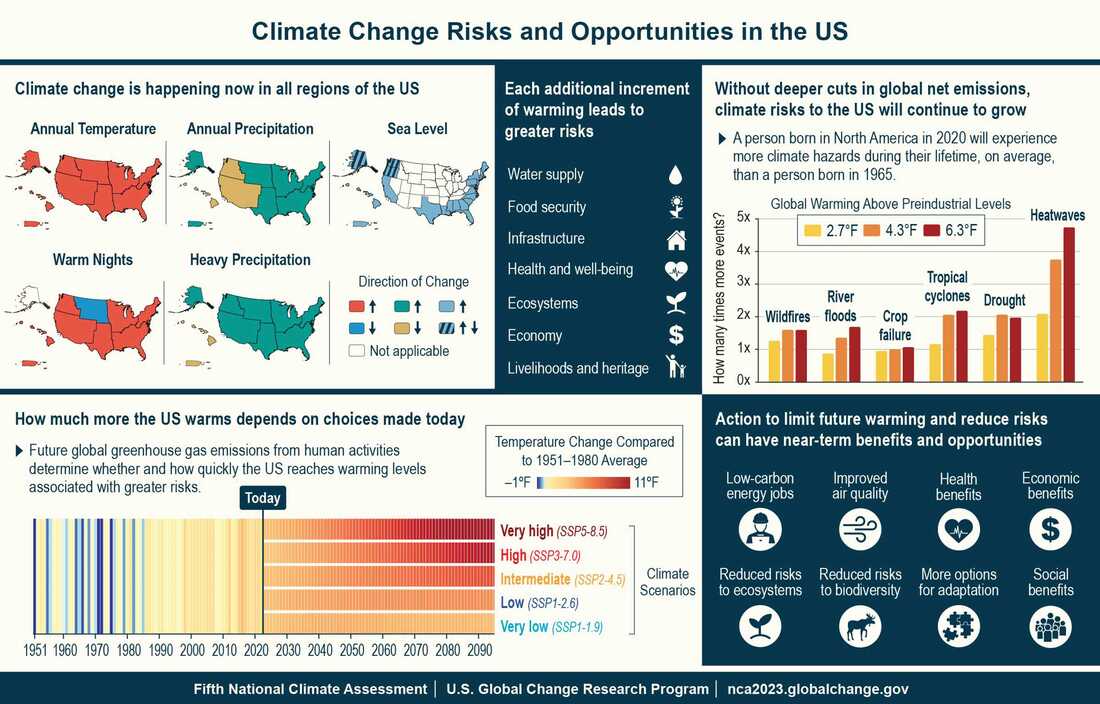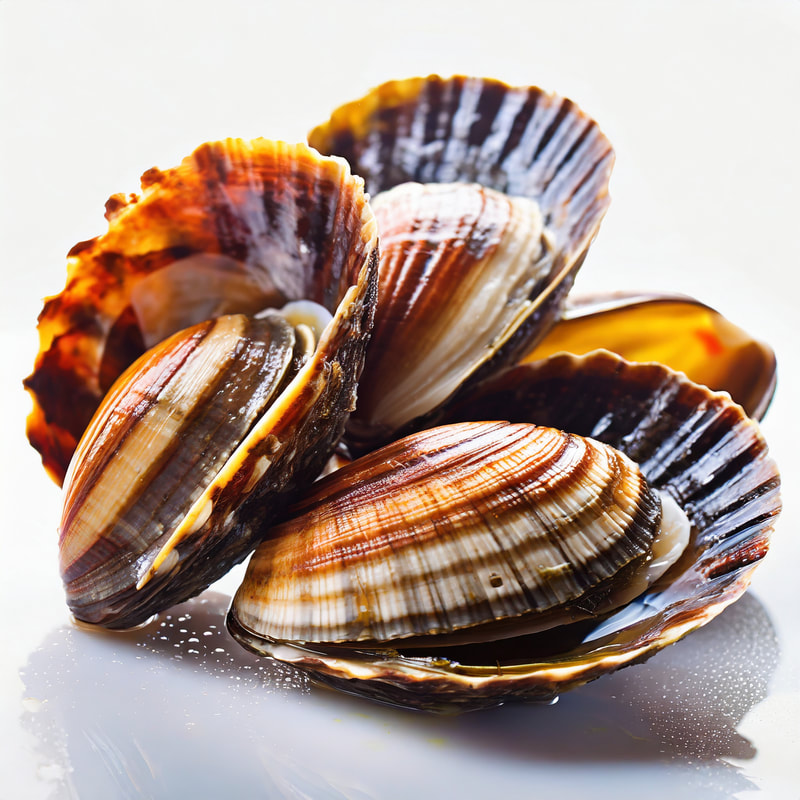|
USGCRP is hosting a series of webinars on the findings of the Fifth National Climate Assessment (NCA5). The NCA5 chapter webinars are an opportunity for you to hear about the findings of each chapter from the authors themselves. Each virtual one-hour event is expected to include some time for Q&A. If you have any questions regarding a past or future webinar, please contact Laurie Howell. If you are interested in learning about other opportunities related to the NCA5, please subscribe to USGCRP's newsletter. A full listing of these webinars, taking place from November 27 through March 15, are listed below. Additional details can be viewed here. November 27: Overview
November 28: Built Environment November 29: US Caribbean (Spanish) November 30: US Caribbean (English) December 4: Water December 5: Forests December 6: Southeast December 6: Southern Great Plains December 7: Energy January 9: Northwest January 10: Earth System Processes January 11: Mitigation January 12: Ecosystems January 17: Alaska January 18: Agriculture, Rural Communities, and Food Systems January 19: Tribes and Indigenous Peoples January 22: Coastal Effects and Blue Carbon January 23: Oceans January 26: Complex Systems and Compound Extreme Events February 12: Social Systems and Justice February 13: Hawaii and US-Affiliated Pacific Islands February 14: Human Health and COVID-19 February 15: Adaptation February 16: International February 20: Midwest February 21: Transportation February 22: Northeast February 23: Southwest and Western Wildfire February 27: Northern Great Plains February 28: Air Quality March 4: Economics and Supply Chains March 12: Indicators March 15: Land Cover and Land Use Change
0 Comments
The Fifth National Climate Assessment (NCA5) highlights adaptation, carbon reduction strategies for reducing risks
Some of the key findings from the report are:
Read more Courtesy of NAA:
On Tuesday, the Fifth National Climate Assessment was released. The Fifth National Climate Assessment is the US Government’s report on climate change impacts, risks, and responses. It is a congressionally mandated interagency effort that provides the scientific foundation to support informed decision-making across the United States. Within the report, the authors note: “…farmers, ranchers, and fishers have always faced unpredictable weather, climate change heightens risks in many ways:
In response, some farmers and ranchers are adopting innovations—such as agroecological practices, data-driven precision agriculture, and carbon monitoring—to improve resilience, enhance soil carbon storage, and reduce emissions.” Aquaculture misinformation online and on social media has become a significant issue for our industry, with inaccurate and sensationalized content circulating widely, often influencing public perceptions and decisions. Common false information often includes inaccurate claims about the use of antibiotics, poor husbandry practices, negative impacts on other ecosystems, misleading information about the nutritional value of farmed fish, and so much more. We've all seen it - and we need to start doing something about it!
Addressing this misinformation and encouraging a more accurate understanding of aquaculture's complexities and benefits has become crucial to the survival of our industry. Thankfully, many online and social media platforms have begun taking the spread of misinformation more seriously. So what do we do? Below is a brief guide, focused on social media, of how to both report misinformation online and better represent the industry with facts, benefits, and increased transparency. Represent the Industry with Positivity and Transparency Not all of us have the time or resources to continually create content online and on social media. But for those who do, below are some quick tips to help represent our industry online by increasing transparency and delivering an engaging, unified message about aquaculture:
Report Misinformation Many online and social media platforms have begun taking the spread of misinformation much more seriously. It is up to us, as industry professionals, to report misinformation when we see it. Below are instructions on how to report misinformation on today's most popular platforms:
X (formerly Twitter)
TikTok
YouTube
NOAA’s Teacher at Sea Program offers educators a unique opportunity to join NOAA scientists aboard an ocean research vessel as a member of the science team. Since 1990, more than 850 teachers have sailed on NOAA surveys monitoring our nation’s fisheries, measuring physical and chemical ocean trends, and charting unknown regions of the seafloor.
Participants return to their classrooms with first-hand accounts of what it’s like to live and work at sea, illustrated by photos, blogs, and lesson plans. Their personal connections to NOAA’s science and stewardship help Teachers at Sea communicate the importance of NOAA’s mission to communities across the nation... Read more and apply here. The review discusses the issue of microplastics (MP) contamination and its impact on particle-feeding molluscs. It highlights that the scientific literature on this topic has been rushed and contains numerous methodological flaws, misinterpretations, and exaggerated claims. The review provides a critical assessment of over 750 publications and finds that most have significant flaws. It also points out that while microplastics are commonly found in molluscs, the actual levels are very low and not demonstrated to pose a serious risk to human health or the shellfish themselves. The review identifies common mistakes in field and laboratory studies and emphasizes the need for rigorous, well-designed research. It also suggests that bivalve molluscs may not be reliable indicators of microplastic pollution and calls for harmonized methodologies and more stringent peer-review processes in scientific journals.
View the full paper here. Courtesy of NAA:
The Federal Motor Carrier Safety Administration (FMCSA) has posted to their website today the following: “In accordance with the Fiscal Year 2024 Continuing Resolution, Public Law 118-15 (Sept. 30, 2023), transporters of livestock and insects are not required to have an electronic logging device. The statutory exemption will remain in place until further notice. Drivers do not need to carry any documentation regarding this exemption.” The notice is posted here: Livestock and Insect Haulers | FMCSA (dot.gov). The National Aquaculture Association recommends long-haul, commercial motor vehicle aquaculture livestock haulers print out and provide this notice to their drivers to be carried with them while on-the-road. Courtesy of NAA:
Join Dr. Matt Parker for an upcoming University of Maryland webinar where he will discuss how to interpret results from the University of Maryland Online Economic Spreadsheet Tool for Oyster Aquaculture. This new tool provides a variety of information that can be used for business planning and funding applications. View the tool online before the webinar. The webinar will explain how to interpret financial metrics such as net present value, modified internal rate of return, payback period, and cash flow. The webinar will also discuss how to interpret how risky the modeled shellfish business may be based on the inputs provided by the user. The NMFS-Sea Grant Joint Fellowship Program in Population and Ecosystem Dynamics and Marine Resource Economics places Ph.D. students in research-based fellowships that provide support for up to three years. The program is designed to fulfill workforce development needs identified by the NOAA National Marine Fisheries Service (NMFS) and since 1999, has provided opportunities for 167 Ph.D. students.
The opportunity to apply for 2024 fellowships is now open. Applications are due to Sea Grant programs on January 25, 2024. Learn more about the fellowship program Get started on your application with:
Questions? Contact your local Sea Grant Program or the National Sea Grant Office at oar.sg.fellows@noaa.gov / (240) 507-3712. Courtesy of NAA:
The National Aquaculture Association (NAA) is seeking nominations for the Joseph P. McCraren Lifetime Contributions to the Aquaculture Industry award and the Joseph P. McCraren Outstanding Contributions in Promoting the Growth of Aquaculture award. Visit NAA's Joseph P. McCraren webpage to learn more about Joe and the award. If you would like to nominate someone for either or both awards, please complete the Nomination Form by midnight, Friday, January 19, 2024. The awards will be presented during the Plenary Session of the Aquaculture America 2024 on Monday, February 19, 2024. The opportunity to submit nominations is restricted to NAA Individual, Silver, Gold or Platinum members. Recipients are not limited to NAA members. The NAA Board of Directors serves as the Award Committee and will select the Award recipients by secret ballot. The Outstanding Contribution award does not have to be given on an annual/regular basis and may be given to more than one recipient at a time at the discretion of the Board of Directors. However, only one Distinguished Lifetime award may be given per year. |
Oregon Aquaculture Association
P. O. Box 1210, Turner, OR 97392
info@oregonaquaculture.org
P. O. Box 1210, Turner, OR 97392
info@oregonaquaculture.org
Copyright © Oregon Aquaculture Association



